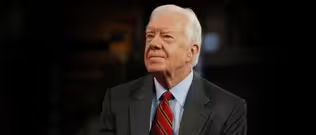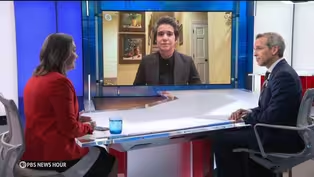
Social media trend encourages young people to buy less
Clip: 12/30/2024 | 6m 49sVideo has Closed Captions
Social media trend encourages young people to buy less and reconsider their consumption
Last-minute sales, limited-time offers and half-off deals can be hard to resist for some holiday shoppers. This season, Americans were projected to spend seven percent more than 2023. But a social media trend is urging eager consumers to hit pause before pressing the purchase button. Paul Solman reports.
Problems playing video? | Closed Captioning Feedback
Problems playing video? | Closed Captioning Feedback
Major corporate funding for the PBS News Hour is provided by BDO, BNSF, Consumer Cellular, American Cruise Lines, and Raymond James. Funding for the PBS NewsHour Weekend is provided by...

Social media trend encourages young people to buy less
Clip: 12/30/2024 | 6m 49sVideo has Closed Captions
Last-minute sales, limited-time offers and half-off deals can be hard to resist for some holiday shoppers. This season, Americans were projected to spend seven percent more than 2023. But a social media trend is urging eager consumers to hit pause before pressing the purchase button. Paul Solman reports.
Problems playing video? | Closed Captioning Feedback
How to Watch PBS News Hour
PBS News Hour is available to stream on pbs.org and the free PBS App, available on iPhone, Apple TV, Android TV, Android smartphones, Amazon Fire TV, Amazon Fire Tablet, Roku, Samsung Smart TV, and Vizio.
Providing Support for PBS.org
Learn Moreabout PBS online sponsorshipNICK SCHIFRIN: This holiday shopping season, Americans were projected to spend 7 percent more than last year.
But our Paul Solman was alerted to a social media trend that in a world of consumerism hits pause before pressing the purchase button.
WOMAN: Get ready with me to go on a shopping spree.
PAUL SOLMAN: The perennial end-of-year messages we have just had to endure in print, on TV, and all over social media, buy away, buy away, buy away all.
WOMAN: Let's do the biggest shopping haul ever.
WOMAN: We're going to go self-care shopping at Sephora, Ulta, Target.
WOMAN: This is everything that I got.
Let's go through it quickly.
PAUL SOLMAN: But here's what's also been trending this year, #Underconsumptioncore.
DIANA WIEBE, De-Influencer: I wanted to show you stuff that I have had for literal decades.
My CHI hair straightener from 2010, 2011, somewhere in there, still works great.
PAUL SOLMAN: Countertrender Diana Wiebe was posting videos like this one.
DIANA WIEBE: You can see I have hit pan on a couple of these, couple of my faves, but it's still good.
It's rejecting what influencers and the companies behind them are trying to get you to do, which is buy more and buy it right now.
PAUL SOLMAN: It's a younger generation's reaction to America's throwaway culture, buy less, repurpose, shop vintage, instead of plunging reflexively for: DIANA WIEBE: I'm just going to be the first one to say it, I guess, garbage.
PAUL SOLMAN: Of course, Wiebe is hardly the first to say it or the first to push underconsumption.
BRETT HOUSE, Columbia Business School: I don't think it's new at all.
It's what we have called in the past living within our means.
PAUL SOLMAN: Brett House, economics professor at Columbia University's Business School.
BRETT HOUSE: I think it's worth noting that, if there's underconsumption happening anywhere, it's almost certainly for people at lower incomes who are facing greater challenges in covering their day-to-day needs.
If we look at past cycles between booms and recessions, in the wake of any slowdown, we have seen people focus more on cleaning up their debt, reducing consumption and aligning expenses with their incomes.
PAUL SOLMAN: Same for garbage products made to expire.
BRETT HOUSE: We have seen products with defined life cycles hit the market for decades.
PAUL SOLMAN: Built-in obsolescence, it's called, a term coined nearly a century ago.
But, hey, how better to keep the hamster wheel of consumerism spinning?
Problem is, says Wiebe, it's getting worse.
DIANA WIEBE: I have seen a decline in quality just over my lifetime.
I'm only 30 years old, but I can see when things are not made as well as they once were.
PAUL SOLMAN: And online shopping has never been easier, one click, payment info already saved for products increasingly pushed by influencers posing as your friends.
WOMAN: TikTok just me a notification that the Juvia's Place blushes is $9?
Go get it right now, bestie.
MELISSA BUBLITZ, University of Wisconsin-Madison: They see people having the newest water bottles, the newest fashion, the newest shoes or handbags, and they want those things.
PAUL SOLMAN: Consumer researcher Melissa Bublitz.
MELISSA BUBLITZ: This idea of advertising is not new, but I think what is new is the amount of time and the wide variety of exposure that our young people have to this influencer culture.
PAUL SOLMAN: Look, way back in 1960, "The Waste Makers" urged resistance to built-in obsolescence in the spirit of sustainability.
Two years later, Dr. Seuss rhymed about the exhausted Zizzer-Zoof salesman.
"All day they have raced round in the heat at top speeds, unsuccessfully trying to sell Zizzer-Zoof seeds, which nobody wants because nobody needs."
AJA BARBER, Writer: We, as consumers, in more privileged countries buy five times more clothing today than we bought in 1990, which means that something has changed in our buying habits as well.
PAUL SOLMAN: That beautiful sweater you're wearing, how long have you had that?
AJA BARBER: Eight, going on nine years maybe.
PAUL SOLMAN: Aja Barber is the author of "Consumed," a critique of what we buy and how it's created.
AJA BARBER: I have always shopped secondhand.
It just wasn't very cool.
I remember getting clothing from eBay in the early 2000s when I was a university student and keeping that a bit of a secret from some of my peers, who would think it was icky.
So it's always been the way some of us have done it.
It's just now become a part of a larger conversation a planet that is in duress.
PAUL SOLMAN: As it turns out, 92 million tons of clothing end up in landfills every year.
And, every year, automation will make products, this shirt, say, cheaper, not to mention overproduction that's already peddled at absurdly low prices by Chinese e-commerce companies like Temu and AliExpress, all of which leading to more waste.
AJA BARBER: Looking at all of the clothing that was being pushed on myself and others, I began to wonder where this clothing was going.
I soon learned that there are places in the Global South that end up with mountains of our clothing, and it is not something that is needed or wanted.
DIANA WIEBE: I do see just in my own interactions with people who I'm talking to that they want to consume less, they want to be more mindful of when they're being advertised to.
PAUL SOLMAN: Diana Wiebe's following has swelled from 1,000 to more than 200,000, the meme prompting more than 20,000 posts on TikTok alone.
But here's the rub.
It hasn't made much of an impact on overall consumer spending, says researcher Bublitz.
MELISSA BUBLITZ: We don't see consumption going down.
In fact, our population is growing by less than 1 percent, but our consumer spending is growing at least 5 percent.
BRETT HOUSE: If anything, we have seen slightly higher-than-normal consumption, not underconsumption, in the big numbers we look at.
DIANA WIEBE: But it's still a perfectly good mug.
PAUL SOLMAN: So is the meme all for naught?
No, insists de-influencer Wiebe.
DIANA WIEBE: So, my hope is that people don't necessarily treat it as -- underconsumption core as a trend, but rather just, like, my normal lifestyle is not buying things instantaneously or in great quantities.
PAUL SOLMAN: For the "PBS News Hour," Paul Solman, a bit bummed to have overconsumed yet again this year while doing this very story.
Critics reveal their picks for the best books of 2024
Video has Closed Captions
Clip: 12/30/2024 | 9m 3s | Critics reveal their picks for the best and most important books of 2024 (9m 3s)
Jimmy Carter remembered as humanitarian and statesman
Video has Closed Captions
Clip: 12/30/2024 | 2m 52s | Jimmy Carter remembered as humanitarian and statesman (2m 52s)
A look at Carter's accomplishments and human rights legacy
Video has Closed Captions
Clip: 12/30/2024 | 10m 15s | A look at Carter's accomplishments as president and his legacy as a human rights champion (10m 15s)
Tamara Keith and Amy Walter on Trump defining Biden's legacy
Video has Closed Captions
Clip: 12/30/2024 | 9m 16s | Tamara Keith and Amy Walter on how Trump's 2nd term could define Biden's legacy (9m 16s)
U.S. sees sharp decline in murders and other crimes in 2024
Video has Closed Captions
Clip: 12/30/2024 | 6m 43s | U.S. sees sharp decline in murders and other crimes in 2024 (6m 43s)
Providing Support for PBS.org
Learn Moreabout PBS online sponsorship
- News and Public Affairs

FRONTLINE is investigative journalism that questions, explains and changes our world.

- News and Public Affairs

Amanpour and Company features conversations with leaders and decision makers.












Support for PBS provided by:
Major corporate funding for the PBS News Hour is provided by BDO, BNSF, Consumer Cellular, American Cruise Lines, and Raymond James. Funding for the PBS NewsHour Weekend is provided by...




